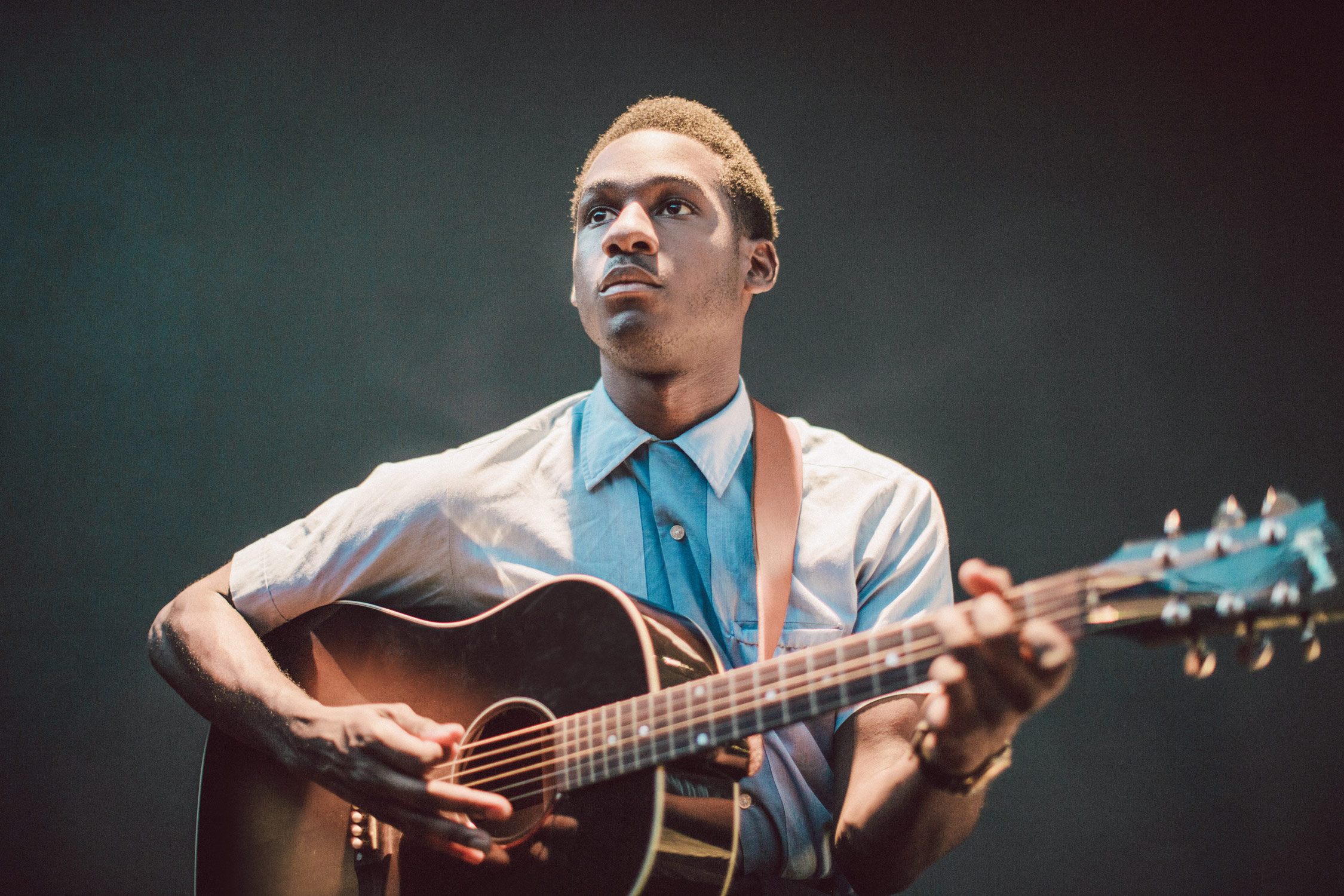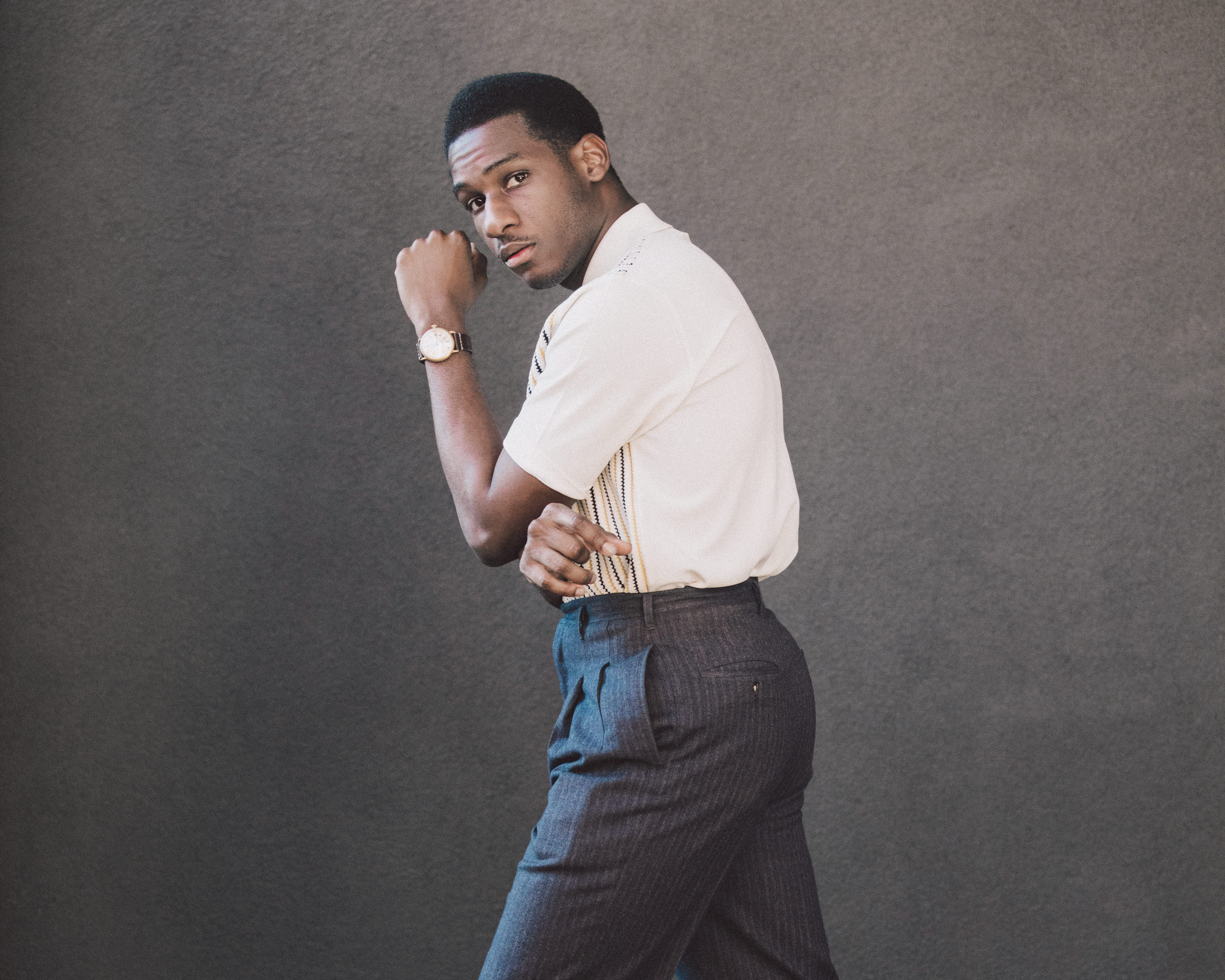
- Interview by Tina Essmaker January 10, 2017
- Photography by Elizabeth Weinberg
Leon Bridges
- musician
- singer-songwriter
From his humble Fort Worth, Texas, roots to stages around the world, Leon Bridges’ talent has catapulted him into the spotlight since his first album, Coming Home, debuted in June 2014. Compelled to make music before anyone knew his name, the rising star played open mic nights and performed in smoky bars, and he hasn’t forgotten his roots. Here, Leon offers an intimate glimpse into his early days, recalls how he discovered his voice through a connection to soul music, and imagines what the future holds as he makes a point to remember his past.
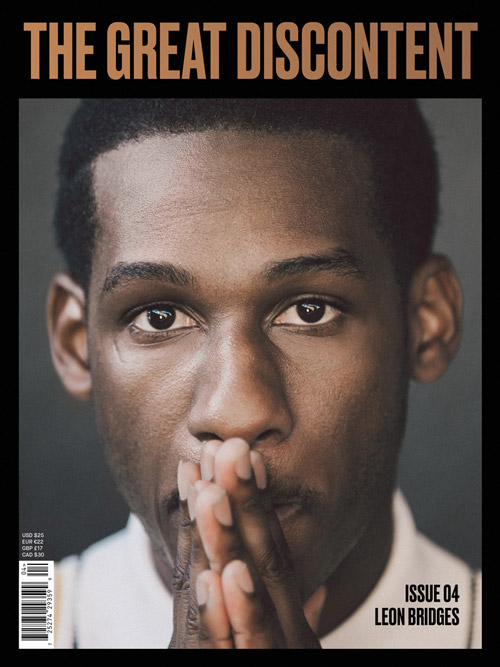 Editor’s note: This is a print-first feature, originally published in The Great Discontent, Issue Four. Pick up the issue in our shop.
Editor’s note: This is a print-first feature, originally published in The Great Discontent, Issue Four. Pick up the issue in our shop.
Tell me about your path to becoming a musician. I was born in Atlanta, Georgia. My parents moved us to Fort Worth, Texas, when I was two years old and they separated when I was still very young. I grew up listening to a lot of ‘90s R&B music, like Ginuwine, Usher, and 112. As a kid, I wasn’t allowed to own any albums, so the only way I kept up with the music I liked was by listening to the radio. Both of my parents exposed me to a little bit of soul: my mom was into gospel music and listened to artists like Anita Baker and Brian McKnight, and my father was into guys like Curtis Mayfield and Stevie Wonder.
I was also really into dancing, which went hand-in-hand with my love of music. In high school, I danced with my friends in the hallways between classes. Our role models were the hip-hop artists who danced in their videos, and we tried to mimic them.
After I graduated high school, I went to Tarrant County College. We called it the 13th grade because everyone from my high school went there. I knew I was there to take care of business, so I took standard classes, like English and math. During that time, I heard about a dance instructor there who provided a great atmosphere for both experienced dancers and people who had never danced in their lives. I met people from the dance program, and my older brother had taken a hip-hop class a year ahead of me. I became curious, so I signed up for a hip-hop class the following semester because that was my territory. Eventually, I was brave enough to take ballet. I got hooked. At one point, I wasn’t taking any academic classes. (laughing) In the three years that followed, I learned everything from ballet to jazz to modern dance.
One day after class, somebody told me that there was a guy in the cafeteria playing a piano while people took turns singing. I knew I could sing a little, so I decided to check it out. At first, I was shy, so I stood and watched everyone else sing. After a while, I realized it was a great opportunity to show people that I had a little something in me, so I got up the guts to sing at one of the sessions. It was the first time I had ever sang in public, and one of the guys listening told me I sounded pretty good. That was the spark I needed to believe in my abilities. After that, I started singing in the cafeteria every day between classes. It was hard for me to get schoolwork done because I was so excited to be there with everyone, singing and making up songs. I miss those days.
Over time, I grew tired of depending on others to be creative, so I decided to buy a guitar and write songs on my own. I knew I wanted to do something different with R&B, but I hadn’t found a connection to soul music yet. At first I thought the alternative to current R&B was neo-soul, so I tried that. From the moment I picked up a guitar, everything was cool, but I didn’t feel at home with the genres I tried to play. I began to recognize that ‘50s- and ‘60s-era soul music had been the best time for R&B. I looked at the music of today and was confused: why wasn’t anybody carrying on that golden sound, specifically within Black music? As a young Black man, I felt a need to go back to those roots, to where it all started.
I decided to go to local open mic nights, the first of which was actually on my campus. That same piano player and I worked on a few covers and sang three or four songs together. Even though there were only five people in the audience, I was nervous and sure that the performance sounded like crap, but I think people saw that there was a little something there.
“Over time, I grew tired of depending on others to be creative, so I decided to buy a guitar and write songs on my own. I knew I wanted to do something different with R&B, but I hadn’t found a connection to soul music yet.”
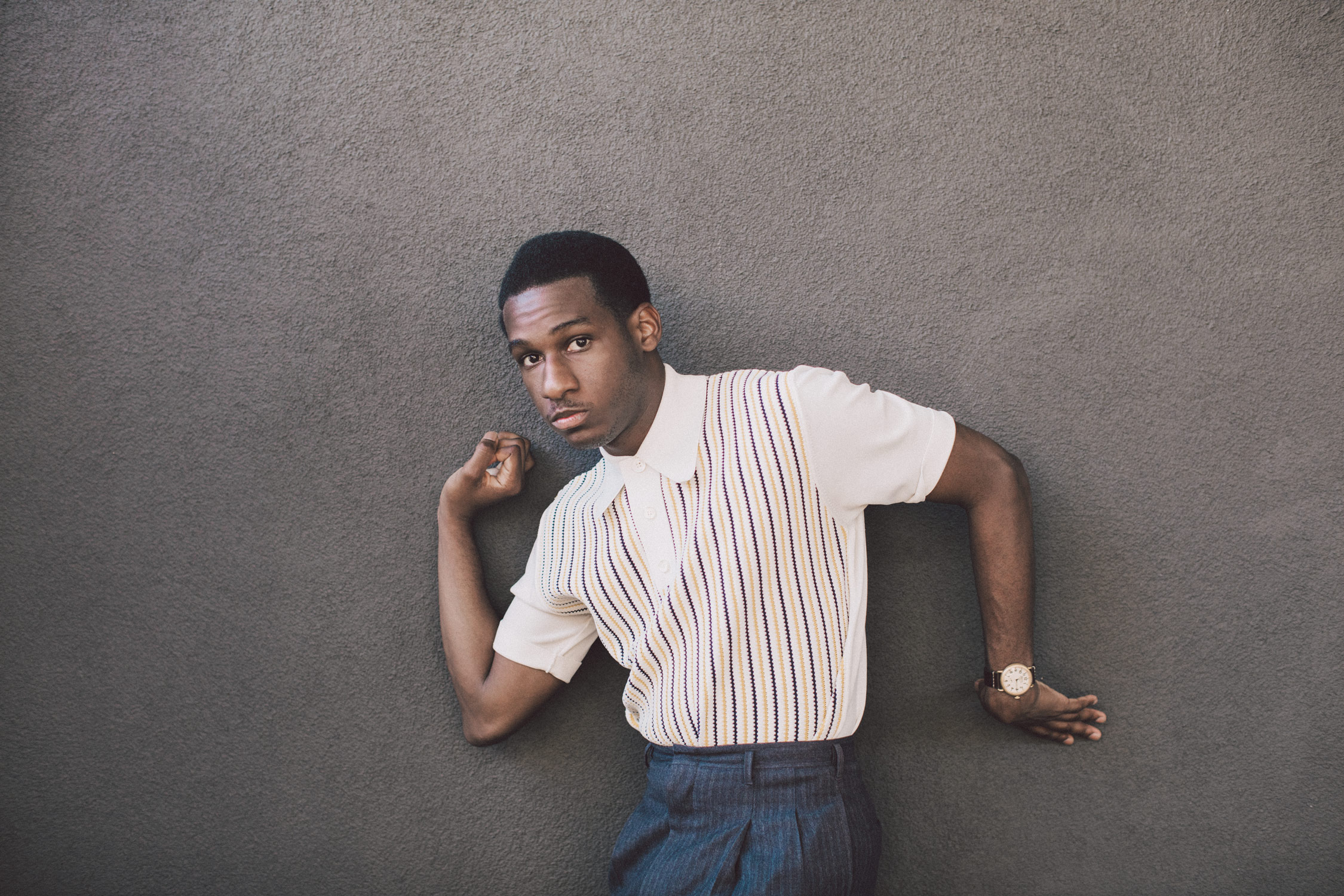
Did you continue school at that point or did you decide to pursue music professionally? I had to stop taking classes because my mom lost her job. In order to make extra money, I worked two jobs. One was on an assembly line, where I made eye solution at a place called Alcon, and the second was bussing tables. It was embarrassing—at my age, I knew I needed to move out of my momma’s house and do something meaningful. Music definitely kept me sane and saved me. It was my escape. After a long day of work, I’d go home and into my room to create.
A door opened up for me when I saw a Facebook post about an open mic night at a local church. The person who ran that open mic had also started an open mic at a coffee shop called Stillwater Coffee Shop near Texas Christian University. It was a cool, low-key hangout where everybody went, and it attracted a lot of musicians with good vibes. I performed at the open mic there every Thursday for almost two years until the place was shut down. It was sad when that happened because it was something I looked forward to every week. Luckily, another open mic was started at a larger venue with larger crowds, which was a step up to the next level for me. I watched myself grow more as a performer with each show I played.
After a while, I played my own shows in smoky little bars around town. My mother didn’t know what I was up to—she didn’t agree with me playing in smokey bars, so I did it without telling her. I got off work around 10pm, performed, and then snuck back into my mom’s house late at night. She was always asleep, so it worked out. (laughing)
One of the venues I performed at regularly was called Magnolia Motor Lounge. A guy named Sam Anderson, who plays in a band called Quaker City Night Hawks, offered to let me play songs in between his sets since he had a residency there every Tuesday. It was a different crowd than the open mic nights I did before, and I played there for two years.
Performing at Magnolia Motor Lounge led to a pivotal moment in my music career. One night as I played solo, Austin Jenkins from the band White Denim came to see Sam Anderson. After I finished my set and walked off the stage, Austin came up to me and said, “We have to record some songs, man.” He told me that he’d call some guys in town and we could go into the studio and see what would happen. I said, “Cool, let’s do it,” but didn’t think much of it. Surprisingly, he didn’t screw around. Right after that meeting, Austin called me and said, “Bring your acoustic guitar over and play all of the songs you have.” I played everything, and a couple days later Austin added simple GarageBand arrangements with a Casio keyboard and a drum beat to give me an idea of what my songs could sound like. When I heard them, I was blown away. I immediately saw an open door for my vision to be manifested.
In August 2014, we went into the studio. The space was a warehouse, which we set our gear up in. The guys brought a bunch of vintage equipment, which they had been saving to record an analog soul album. That’s where we recorded my debut album, Coming Home.
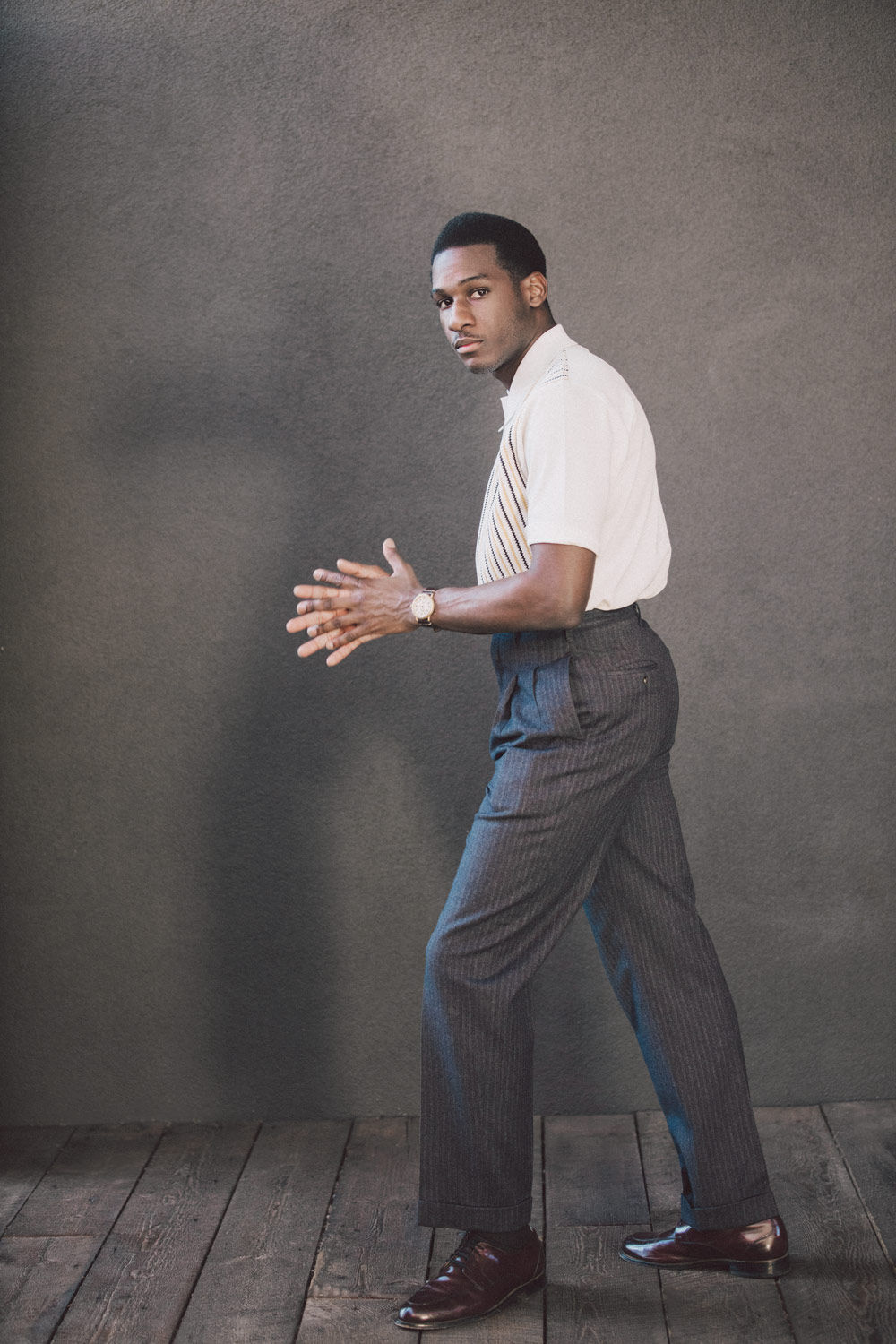
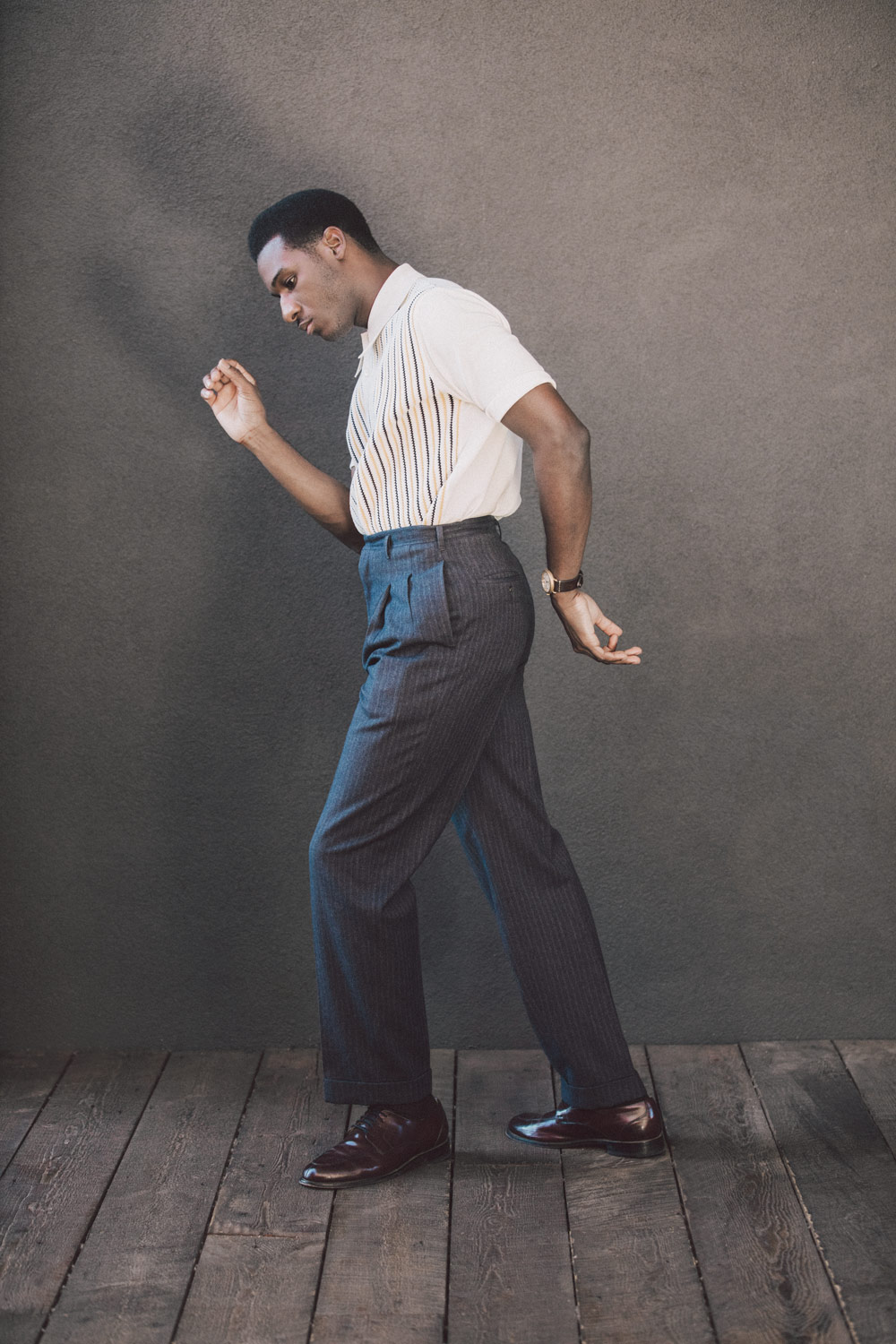
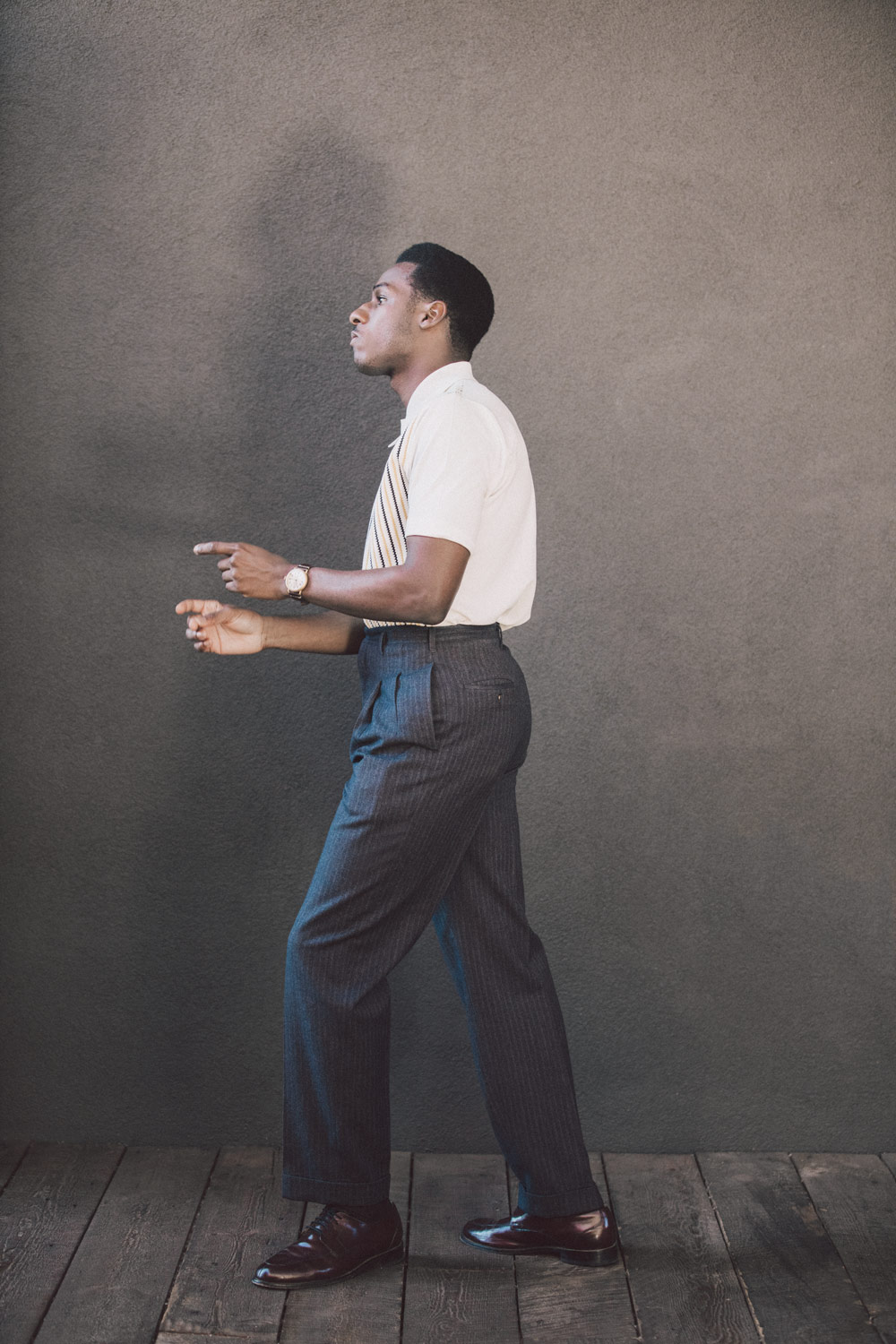
What a story! You had written and performed your own material for years. When you played with a band, did that bring your music to life in a fuller sense? Absolutely. I know there are skeptics out there who question my authenticity, but when I picked up this type of sound, I didn’t think, “This is going to be successful.” At the time, it was just me on the guitar. But I’m not a guitar player and I couldn’t depend on my guitar skills to make it as a solo artist, so I didn’t have much hope. I was passionate about writing songs and recreating that type of soul music. I needed somebody to come along and sharpen what I had, which is exactly what Austin did. He is a sweet guy who is a skilled music director and arranger. Meeting him changed everything.
Did you have a manager at the time? Kind of, but it wasn’t official. There were some guys who managed Austin’s band, and he told them, “Hey, we’re recording this guy out in Fort Worth.“ They were Zeke Hutchins and Jonathan Eshak from Mick Artists Management. Austin sent them the demo and they were like, “What is this? Is this even real?”
It seemed like you just appeared on the scene and we were all asking, “Where’d this kid come from?” But, in reality, you had been playing at open mics for four years. Exactly. It’s hard for me to believe it.
What happened next? In late 2014, the guys from Mick Artists Management came down to Fort Worth to meet with me, and they said they wanted to be my managers. We decided to take it slow and not rush into anything, so we agreed to a trial run. We decided to release two demo songs, “Coming Home” and “Better Man,” on Soundcloud in October. Our buddies at the music blog, Gorilla Vs. Bear, picked the singles up and put them into the hands of the tastemakers. At the time, I didn’t know how big that blog was because I didn’t know anything about blogs.
Shortly after that, my saxophone player and I took a trip to New Orleans to have a good time and hopefully play some shows. Every hour during the drive, we checked the play counts on “Coming Home,” and it was blowing up. I think the BBC was the first to play it overseas. People from around the world sent me messages on Facebook to say, “We love you! Come play here!” I even had offers to play a few festivals. Those songs weren’t even mixed, but people loved them. They resonated with people who were hungry to see somebody bringing back that kind of sound.
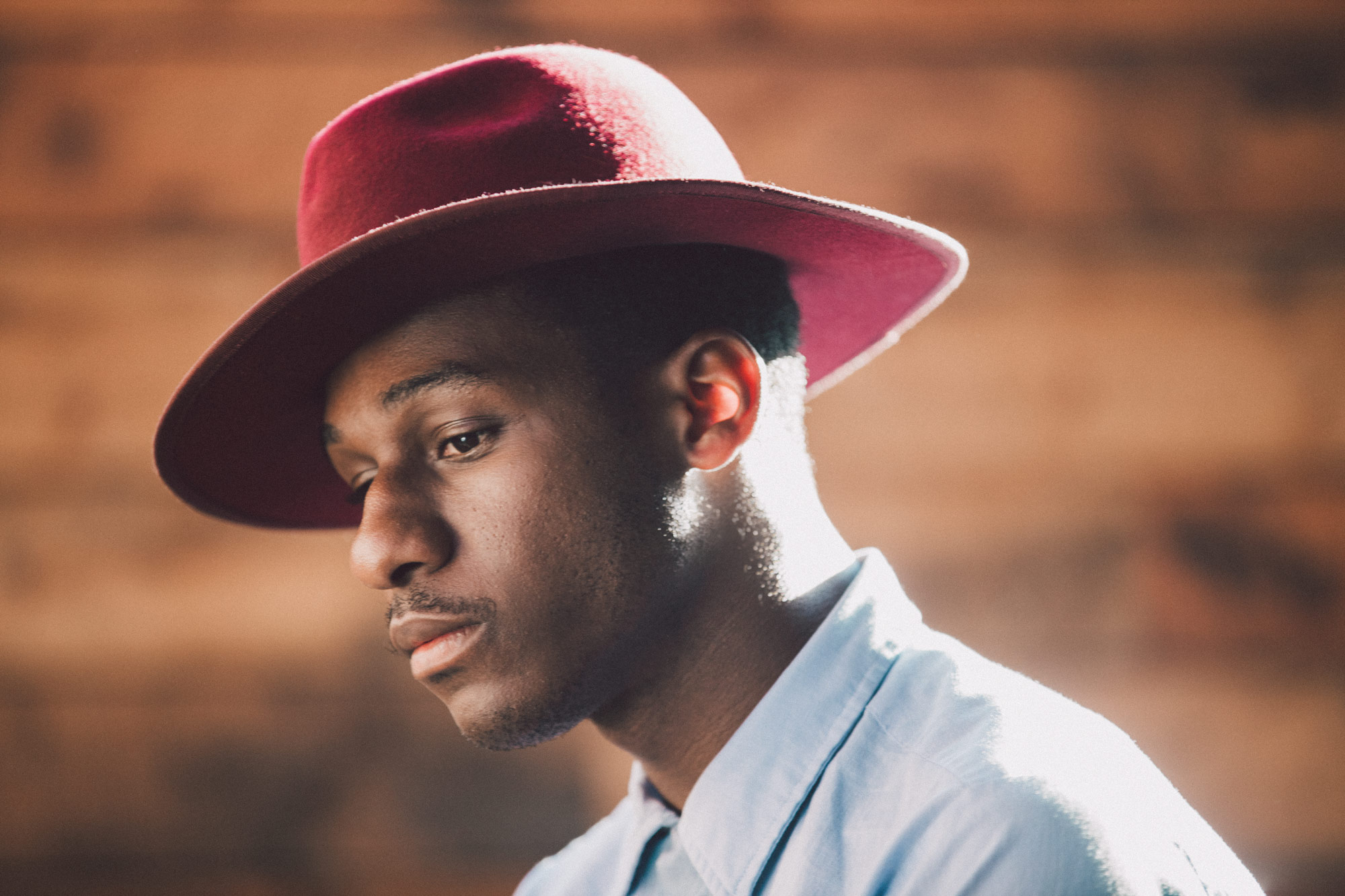
“…you could be the most talented person around, but it all boils down to being in the right place at the right time. Look around at what’s out there and figure out how you can set yourself apart. Continue to work hard, better yourself, and stay creative.”
That’s awesome! Your album was recorded, but there was no record deal yet. Did people begin to approach you about signing? Yeah, it was mind-blowing! I think about where I came from. I’m nothing but a Fort Worth kid. I’m no poet. I just do what feels good to me.
There were numerous labels interested, and all of them were great, but I signed with Columbia Records. I told my management that there would be no changing the record. We presented everyone the demo as we had originally recorded it. The people at Columbia heard it and loved it. The fact that they accepted songs that hadn’t been mixed and believed that a song like “River” could be enjoyed by a mainstream audience speaks to their character as a label. I felt like they were the best route to go, and it’s been great.
Does your mom know you’re sneaking out and playing shows all over the country? (laughing) Yeah, she probably knows by now. (laughing) I had actually moved out of her house and was sleeping on a friend’s couch before all of this happened. I signed with Columbia Records in December 2014. When I went home to my mom’s for Christmas, I told her that I didn’t have to wash dishes anymore because I was going on tour. Moms are always a little skeptical, though. She didn’t realize how real it was until I paid off all of her debt at the beginning of 2015. Then she saw me on TV and said, “Okay, this is serious.”
Is there a certain message you try to communicate through your music? I like to write music that anybody can easily understand. There are different messages in my music and there are themes that touch on the Gospels and faithfulness, but a lot of it comes from my life experiences. I write whatever comes to mind, whatever I’m feeling at the time.
Now that your focus is on music, do you feel creatively satisfied? Definitely. Like anybody, I can sometimes get down and feel unhappy. But this is the best life I could ever have, and I wouldn’t have it any other way. I’m incredibly thankful for the opportunity to do what I love for a living.
You started out in Texas and you’re still there, right? Yes, I rent a little apartment on the south side of Fort Worth. The studio is in the area, and so are all of my friends, so it’s a place I can always come back to. I decided to stay in Fort Worth because it feels good to walk down the street and reminisce about when I walked those same streets with my guitar, back when nobody knew who I was. I miss that.
Do people recognize you on the street now? Yeah, but it’s funny because I still don’t dress down. A lot of celebrities wear hoodies to disguise themselves so they aren’t hounded by people, but I don’t think I can do that. (laughing) I get recognized a little more often in London and am easily recognized in Austin and Dallas, but it’s still on a smaller scale.
Based on your experiences so far, what advice do you have for someone who is starting out? Honestly, you could be the most talented person around, but it all boils down to being in the right place at the right time. Look around at what’s out there and figure out how you can set yourself apart. Continue to work hard, better yourself, and stay creative.
I believe in staying humble and being content with the platform you have. In the early days, I played shows with only one other person in the room, but I was just as happy to play for one person as I would have been playing for a large audience.
Is there any advice you have for your future self? Never forget where you came from, continue to work hard, and always put others before yourself.
Speaking of the future, what are your ambitions for the coming year? The next step is to finish writing the new record. I want to make it better than the first: I’m stepping up my game lyrically and musically. I can’t wait for the world to hear it.
“In the early days, I played shows with only one other person in the room, but I was just as happy to play for one person as I would have been playing for a large audience.”
